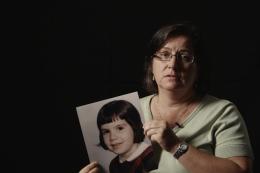Michalczyk Film Bears Witness to Abuse Scandal
By Sean Keeley
“The past is never the past because it’s your past, your present, and your future,” said Alexa MacPherson about halfway through the documentary Who Takes Away the Sins…: Witnesses to Clergy Abuse. “It becomes you, it defines who you are.” Those words echoed through the Museum of Fine Art’s Remis Auditiorium this weekend, as Who Takes Away the Sins screened there on Friday, Saturday, and Sunday. The film, co-produced by husband and wife team and Boston College professors John and Susan Michalczyk, is an attempt to bear witness to a very ugly and disturbing past indeed: the history of the Catholic Church’s sex abuse scandal, which drew headlines across the world in 2002. Focusing locally around the Archdiocese of Boston, where the scandal first broke, Who Takes Away The Sins includes a broad assortment of testimonies from survivors, advocates, an investigative reporter, a concerned clergy member, and the attorney who represented many of the Church’s victims. The result is an impassioned and moving film that integrates a diversity of viewpoints into its inescapable conclusion: that the Church knowingly covered for abusive priests and hushed up their crimes to protect its reputation. As the Church has refused to reckon with its past, the victims have struggled to move on from their childhood traumas. While the details of each victim’s testimony are unique, the general story is familiar. Survivors tell of growing up in an environment that revered the Catholic Church and made questioning its authority unthinkable. Many of their abusers ingratiated themselves into their family lives thanks to their status as priests. MacPherson explains that most of her abuse happened in her family home, with her parents 10 feet away in some other room. David Carney recalls being betrayed by a priest who mentored him at school and drove him home. Gerald Sypek was repeatedly abused while growing up in a Catholic orphanage. He explains that his abuse has inhibited him from trusting people or forming close relationships. Who Takes Away the Sins is all the more powerful for letting these stories speak for themselves. It is not a flashy film stylistically, nor does it need to be. The horrific stories of the survivors and the legacy of pain written on their faces need no adornment. At the same time, the Michalczyks’ film expands from witness testimonies to explain the scandal’s larger context. Walter Robinson, a reporter for The Boston Globe who covered everything from contentious political battles to the Gulf War, says that it was the toughest story he ever had to cover. Mitchell Garabedian, the attorney who filed hundreds of lawsuits against the Church, explains his ongoing battle to change the statue of limitation laws to hold the Church accountable. Advocates like Paul Kellen and Anne Barrett Doyle describe their efforts to launch organizations to get information about abuse cases out to churchgoers and hold bishops accountable. In this sense, Who Takes Away the Sins has a silver lining amid all the gloom, showing how advocates are working tirelessly for accountability. The panel discussion that followed the screening on Saturday afternoon brought this fight into the spotlight. Several of the film’s subjects were present, including survivors like Sypek and Kellen who have now devoted their lives to fighting for the cause. In response to a question about the road to recovery, Sypek said, “My road to recovery is actually working with other victims and working to get all this information out.” Doyle and Garabedian, meanwhile, stressed the legal barriers to action against the Church. A bill currently in the Massachusetts State House would abolish the statue of limitations on child sex crimes, a key action that would allow more victims to file suit. But it has remained stuck in committee, and the panel’s speakers urged the audience to call House Speaker Robert DeLeo to pass the bill. The film has certainly become a passion project for the Michalczyks. John Michalczyk has amassed an extensive filmography of documentaries themed around social justice, taking on subjects like the Berlin Wall and the Sicilian mafia—two films on which his wife Susan collaborated extensively. The idea for Who Takes Away the Sins came from her, too: after hearing abuse survivor and advocate Robert Hoatson on the radio, she pitched the idea to her husband. The project has taken on a life beyond one film, as the Michalczyks are currently at work on a follow-up documentary to premiere in the spring. “We’re doing one on the matters of conscience of those priests and nuns who spoke out about abuse,” John Michalczyk said. Such voices, he explained, suffered severe career repercussions for daring to question the Catholic hierarchy, and their stories have been largely unheard until now. For Susan Michalczyk, giving an outlet to those voices is a matter of education, and it’s a lesson that poses a fundamental challenge to the audience. “John and I, we believe strongly in education, it’s what we do, it’s who we are,” she said. “People need to know, we can’t tolerate bystanders. And once people know, they have a choice: do they want to do something or just let it go.”
|
.
Any original material on these pages is copyright © BishopAccountability.org 2004. Reproduce freely with attribution.
